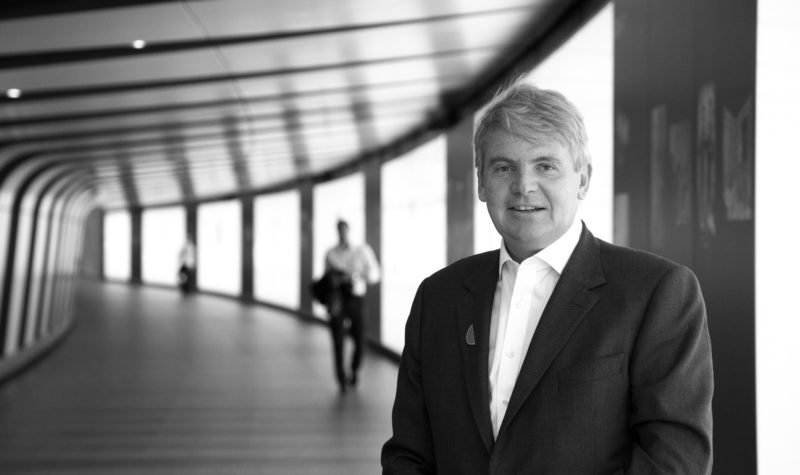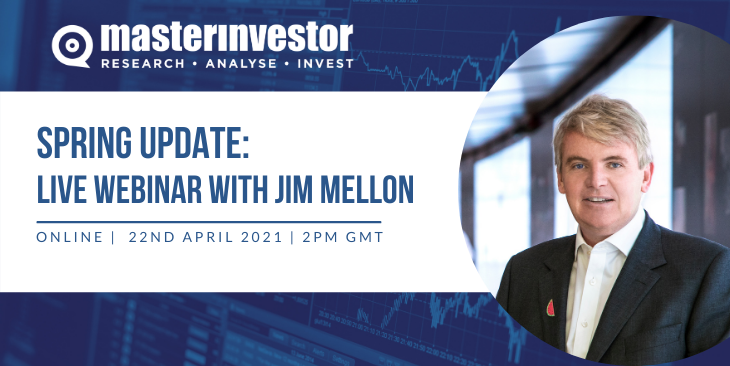Mellon on the Markets: thoughts from Dubai

Inside the mind of the Master Investor: Influential British investor Jim Mellon reveals his latest thoughts on the markets.
I am writing this from Dubai, where I am working for a few days – including buying a couple of properties, as well as meeting some business colleagues.
Many people will think of Dubai as a place full of over-Botoxed “influencers”, partying while much of the rest of the world suffers under stringent lockdowns. A couple of trips ago I observed some of these pouty preening parasites, posturing poolside (how’s that for alliteration?), and inwardly wept. Most of them appeared to be British, and what lamentable ambassadors for our nation!
But, in some ways, my harsh judgement on them, and much of the rest of the world’s wrongly framed view of Dubai as a mere sunny playground, are outdated and born of a false view of the modern era.
Boom time
Let’s start with Dubai. I honestly think this place, along with the rest of the Emirates (including richer brother Abu Dhabi) which all form the United Arab Emirates, is set to boom, in the way that Hong Kong and Singapore boomed in the 1990s and early 2000s.
I first came to the UAE about 30 years ago and was already familiar with its airports some time before that. Those of us old enough to remember will recall that planes travelling to Asia, including to Hong Kong where I then lived, had to stop in a Middle Eastern country to refuel. The stops were always scheduled at some god-awful time, and after a brief trudge around the duty-free weary travellers would get back on their aircraft and be on their way.
Somehow, as planes became capable of flying all the way from New York or London to Hong Kong and Singapore, the airports of the region became more, and not less, important. This was because they started to build out their roles as hubs for regional travel, and none more so than Dubai.
Pre-pandemic, and soon again, Dubai and its home-grown airline Emirates, connected over a hundred destinations throughout this highly populated region. Countries such as India, Pakistan, Bangladesh, Nigeria, Ethiopia, Egypt, Iraq and the Kingdom of Saudi Arabia, among many others, are interconnected by dozens of flights a day in Dubai, and its fast growing and super-modern infrastructure is now the hub of a bicycle wheel with multiple spokes.
Low taxes, a liberal business regime, a multi-racial tolerance and a harmonious and low-crime atmosphere, as well as good quality accommodation (for those that can afford it), have set the scene for what will soon become a massive boom.
The peace treaty signed recently between the UAE and Israel has jump-started investment in real estate in the country, and many thousands of Israelis have arrived in Dubai since the beginning of the year, many of them seeking to do business deals.
The far-sighted federal government of the UAE and the state governments of the various Emirates have been encouraging inward investment, allowing foreigners to fully own local companies and to own real estate (in certain areas) outright.
The two apartments I have bought were developed by EMAAR, which by all accounts is the best in Dubai, and after a six-year bear market in property, there appears to be the beginnings of a price renaissance.
The local currency, the AED (Dirham) is stable, and inflation is low. Construction continues apace, and although the pandemic saw about one million (out of a total of 10 million or so in the UAE) return to their homelands, this is reversing. The UAE depends very heavily on imported labour, particularly from South Asia and the Philippines, and over the years I have seen a clear improvement in the conditions and wages of employees working in construction or hospitality.
The remarkable success of the vaccine rollout in the UAE is also testament to the well-ordered structure of the country with nearly 95% of the population having had at least one shot.
The new Hong Kong
Pictures of Dubai or Abu Dhabi in the 1940s show a different world to the glittering metropolises they are today and emphasise the remarkable achievements of the governments of the states that make up the UAE.
In a world focussed on the East Asian phenomenon, it is easy to forget that the UAE sits at the centre of a populous region with equal vibrancy and potential. Dubai is not Shenzhen – it is not really ever going to be a major manufacturing hub, and nor does it need to be.
Rather, it is a financial, tourism and trading entrepot like none other on the planet. The Dubai International Finance Centre (DIFC) is vibrant, with the usual infrastructure needed for high finance, including international law firms, banks, advisors and money managers.
The one thing that needs to get more traction is the stock market – in Dubai (the Dubai Stock Exchange and NASDAQ Dubai are situated here) and in Abu Dhabi. More companies, not just from the UAE but from around the region, including maybe Indian enterprises, need to be listed here. Speculative activity is high, but there are some good companies here.
On my current trip I intend to investigate some of them. The standout ones appear to be EMMAR, the developer which has single-handedly built the impressive downtown area, including the imposing Burj Al- Khalifa, the world’s tallest building, and also Emirates NBD bank.
I will report back to interested readers on what I find.
There are some downsides, of course. Politics will be a point of contention for some, for instance. But there is also the fact that there is plenty of land to build on so that more property can be created over time, reducing the land values of existing property.
There is also the dependence of the UAE, and in particular Abu Dhabi, on oil and gas, and Dubai’s cyclical reliance on Abu Dhabi for financial support.
The country is food insecure, but cellular and other forms of novel agriculture are coming along to help solve that issue.
There remains instability in the region, but that’s been there forever, and the UAE’s policy of friendship stands it in good stead.
If I had to bet, I would say that Dubai is the new Hong Kong; and just as all those years ago, I embarked on a plane that stopped in Amman, Jordan on its way to Hong Kong, if I was starting again and had youth on my side, I would head to the UAE. Come to think of it, I’m already here!
Stock ideas
Back to the day job, and here are some thoughts. The cyclical share call, particularly in the UK has been a good one. Lloyd’s Bank (LON:LLOY), my favourite recovery play, has gone ex a small dividend and is up 60% in the recent past. You might want to top-slice some, but my year-end target remains 55p.
I have taken a good profit in Prudential UK (LON:PRU), and await the final take out of RSA (LON:RSA). I love Tesco (LON:TSCO) as a share, and would suggest further additions there, especially with a prospective yield of 5% and a fortress-like balance sheet.
Condor Gold (LON:CNR) remains a favourite, but I have taken some profits on Venturex (ASX:VXR), the copper play I have mentioned in the past. Keep with gold and silver – I have no idea on crypto!
Happy Hunting
Jim Mellon

Comments (0)